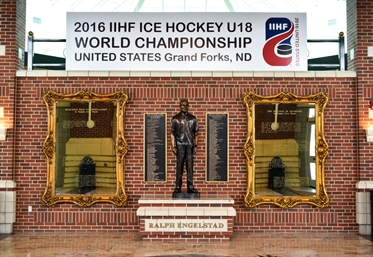Welcome to the Final Four
Welcome to the Final Four
Surprises or no surprises in Saturday’s semis?

 GRAND FORKS, NORTH DAKOTA - APRIL 17: 2016 IIHF Ice Hockey U18 World Championship. (Photo by Matt Zambonin/HHOF-IIHF Images)
GRAND FORKS, NORTH DAKOTA - APRIL 17: 2016 IIHF Ice Hockey U18 World Championship. (Photo by Matt Zambonin/HHOF-IIHF Images)
However, Finland has an opportunity to upset the host United States in the early semi-final (15:00), and it’s also not out of the question that Sweden will beat Canada in the late semi-final (19:00).
It will be tougher for Finland to pull it off, although U.S. coach Danton Cole was complimentary about his blue-and-white opponents.
“It’s a great hockey country,” said Cole. “They always find a way into the medal round. They won the last World Juniors. They know how to play. They’re well-coached. It’s going to be one heck of a game and we’re looking for a real dogfight out there. It should be a great hockey game.”
When the Finns earned the silver medal last year, they did so while being outshot 62-20 by the Americans in a 2-1 overtime final loss. Goalie Veini Vehvilainen stood on his head to keep it close. These are different teams this year, but one aspect of the overall dynamic remains the same: the Americans, with a goal differential of 38-4, are filling the net at a rate that Finland (17-12) can’t match.
That means Finland will need another virtuoso netminding performance. However, neither starter Leevi Laakso (89.7 save percentage, 1.96 GAA in four games) nor Ukko-Pekka Luukonen (88.4 save percentage, 3.00 GAA), who filled in for the 4-3 quarter-final win over Russia, has been brilliant to date. Good, yes, but not great.
To quell Finland’s offence, the Americans know they can focus on 2016 World Junior MVP Jesse Puljujarvi, as well as the line of Kristian Vesalainen (2-3-5), Eeli Tolvanen (6-1-7), and Aapeli Rasanen (1-4-5). In contrast, the U.S. can roll four lines that can all score. Eight out of the top 20 scorers at this IIHF U18 World Champions are Americans, including Clayton Keller (4-6-10), Kailer Yamamoto (5-4-9), and Logan Brown (1-8-9).
The weak Finnish penalty kill (75 percent) means staying out of the box is a must. Otherwise, the Americans will definitely be playing for their third straight title on Sunday.
Of facing the U.S., Finnish coach Jussi Ahokas admitted: “They’re the favorites. We can just let go and give our best and do everything for our goal, the World Championship.”
Meanwhile, Canada appears to be peaking at the right time in its quest for its first U18 World Championship since 2013. Coach Shaun Clouston’s crew laid claim to the tournament’s top power play percentage (45.0) in the 9-1 quarter-final romp over Switzerland, clicking four times.
Captain Tyson Jost, who got the onslaught started with his first-period shorthanded goal, leads the scoring derby (6-8-14) and has tied Connor McDavid’s single-tournament Canadian points record. But he’s happiest about the team’s commitment to playing the right way.
“Our commitment to defence from our forwards and D-men and our goaltender has been unreal,” said Jost, who will suit up at the Ralph Engelstad Arena next year for the University of North Dakota. “That’s something that makes us a special team, how we commit to defence and then the offence will come.”
Where does this leave Sweden in the semi-final matchup? Coming off a 7-2 waxing of Slovakia in the quarter-finals, the Swedes have been good in this tournament, but not quite on par with the Canadians, as their goal differential (25-13) compared to Canada’s (28-6) illustrates.
Six of leading scorer Alexander Nylander’s eight points came in an 8-1 round-robin win over Switzerland. If the Canadians can contain the OHL Rookie of the Year and his linemates Elias Pettersson and Lias Andersson, that will go a long way toward advancing to the final.
Defence-wise, even when you factor in the presence of Sweden’s Timothy Liljegren (1-5-6), the Canadians can easily counter with the firepower of David Quenneville (4-3-7) and Dante Fabbro (0-8-8). And towering rearguards like Jakob Chychrun and Logan Stanley give Canada the physical edge.
After needing overtime to beat Latvia 4-3 in the opener and then losing 6-1 to the Americans, the Swedes have continued to improve. Canada did what it needed to do to get through the round-robin unbeaten, and rose to the occasion mightily in the quarter-finals.
These two nations clashed in last year’s quarter-finals, with Canada winning 5-3, and a similar outcome here wouldn’t be a surprise. Canada has won bronze the last two years, while the Swedes took silver annually from 2010 to 2012.
Regardless of who wins today, U18 fans can look forward to two well-played, hard-fought games.
Back to Overview







































